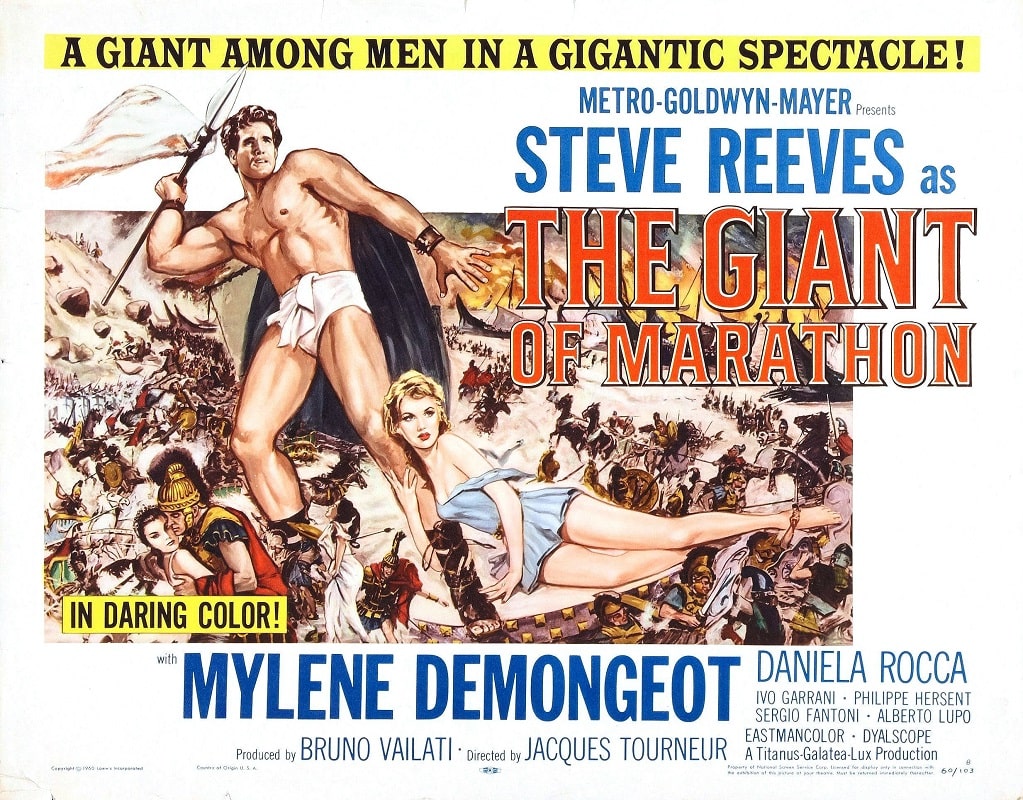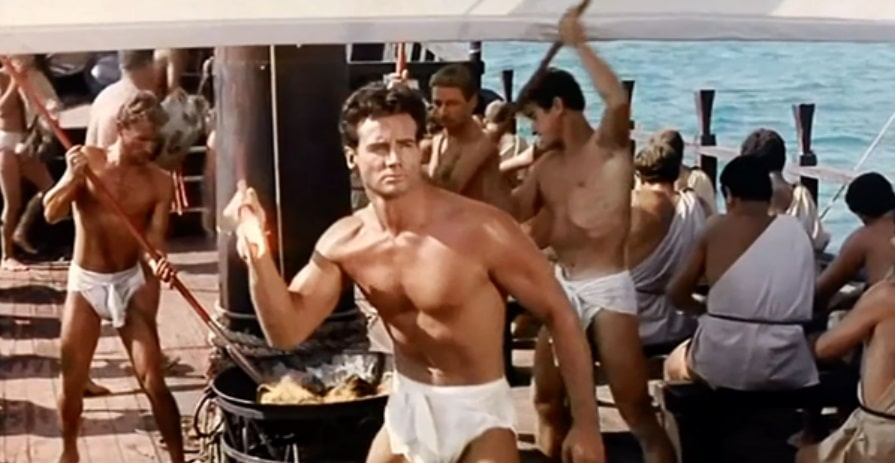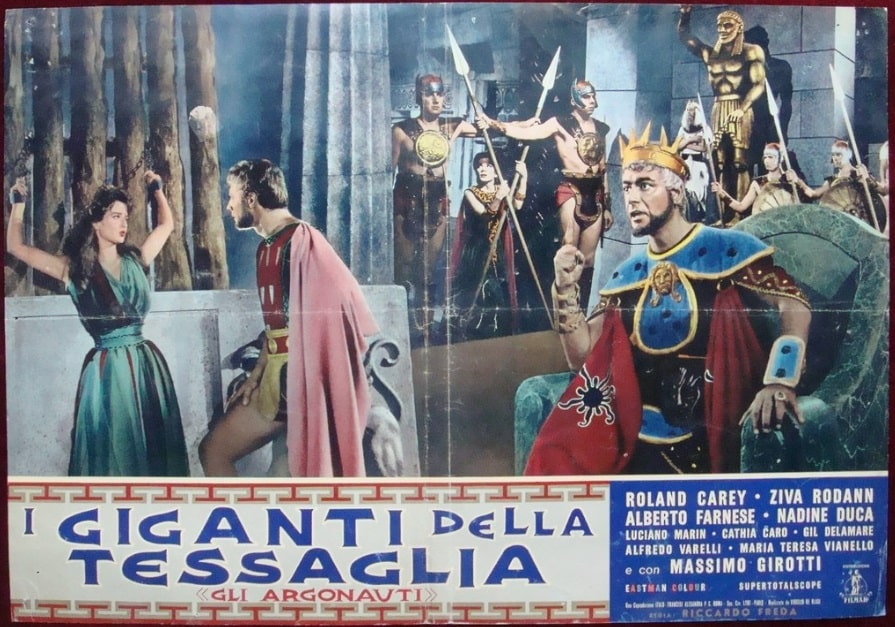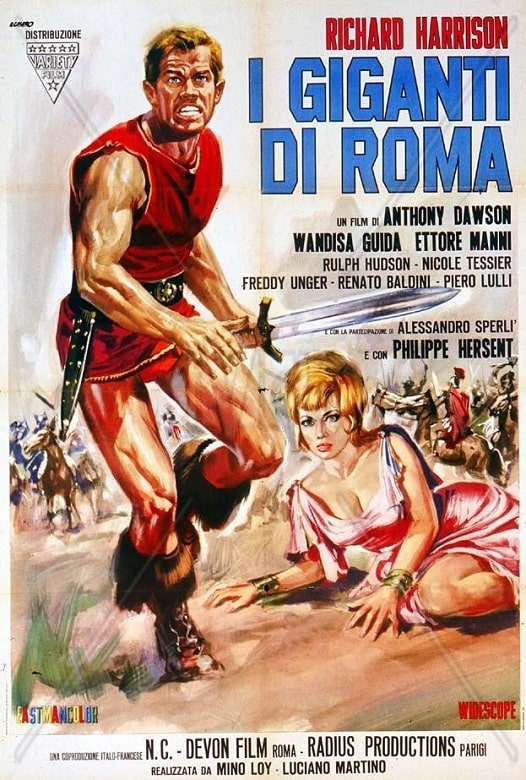Ellsworth’s Cinema of Swords: They Might Be Giants
The Giant of Marathon (Italy/France, 1959)
When you think of Italian cinema, probably the first thing that comes to mind are its great dramatic directors such as Roberto Rossellini, Vittorio De Sica, and Federico Fellini. But you wouldn’t be reading this fine website devoted to genre fiction if the second thing wasn’t Italy’s action films, the Spaghetti Westerns, such as The Good, the Bad, and the Ugly from the decade of 1964-74, and the historical epics from the decade before that, the so-called peplum or sword-and-sandal adventures. The latter movies, with their sword-swinging action heroes, fall inside the ambit of this article series, where we frequently try to draw you attention to them, little known as many of them are to American or British film fans. Here we are again this week, with three more you ought to know about.
The Giant of Marathon (or The Battle of Marathon)
Rating: **
Origin: Italy/France, 1959
Director: Jacques Tourneur
Source: Amazon streaming video
You know what the Italian filmmakers who created the peplum genre really wanted? Respect! After the runaway success of Hercules and Hercules Unchained, producer Bruno Vailati followed up with this serious sword-and-sandal film about the first Persian invasion of Greece in 490 B.C. He hired the stylish Jacques Tourneur as director but had enough commercial sense to keep Steve Reeves as his star and add the Bardot-esque Mylène Demongeot as his love interest, as well as hundreds of extras to fill out the ranks of the Persian, Athenian, and Spartan armies.
Marathon is a sprawling historical epic, handsome to look at but deadly serious and self-important. Reeves’s Hercules could crack a joke now and then, but his Olympic athlete Philippides never smiles and is often downright sullen. Sergio Fantoni is appropriately sinister as the Athenian traitor Theocritus, but I liked him better as the unhinged and maniacal Eteocles in Unchained. And Demongeot has little to do but bemoan her situation and get abducted.
The story is an earnest melodrama of dirty politics and soap-opera romance that, once King Darius arrives with his club-helmeted Persians, dissolves into a series of battles. To make sure all the armies show up to meet each other at Marathon, Philippides has to race across eastern Greece not once but three times. It’s exhausting. The great battle itself is impressively staged and Tourneur shows that he’s studied both Eisenstein and Olivier, though the part where Reeves rolls giant boulders down on the Persians is, I think, original.
The last act ends with an amphibious invasion of the port of Piraeus that includes an underwater battle scene that won’t be topped until Thunderball. Plus, it’s an opportunity to follow the peplum trope of having the good guys fight shirtless, as Reeves leads the Athenian Sacred Guard in disrobing before diving into the waves. A very busy movie, but in the end, not much fun.
The Giants of Thessaly
Rating: **
Origin: Italy/France, 1960
Director: Riccardo Freda
Source: Amazon streaming video
You can’t have too many retellings of the story of Jason and Argonauts, or so the Italian filmmakers of the peplum era seemed to think, because here’s another one. Thessaly has been cursed by Zeus with offscreen volcanoes that will destroy the island unless Jason, King of Iolcus (Roland Carey), quests to Colchis and returns with the Golden Fleece. The Argo sails, but Hercules, Castor, Pollux, and most of the usual crew are missing, though Orpheus is aboard for some reason, making doomy remarks about love and loss. The plot is a weird mix of elements from various ancient sources; for example, there’s no Ulysses either, but Jason fights a giant ape-like cyclops and contends with a witch who is Circe in all but name.
However, let’s not give the impression there’s a lot going on here, because most of the time there isn’t. After every one of Jason’s brief adventures the story shifts for about twice as long back to politics in Iolcus, where Jason’s wicked cousin Adrastus plots to seize his throne and his wife. He does this mainly by meeting with a tedious group I call his Council of Exposition, or his spunkier Committee of Conspiring.
In fact, for an action-adventure film the pacing is strangely deliberate, even weirdly dreamlike during the fantasy episodes. Characters often give solemn speeches while staring into the middle distance, as if that will add significance. American bodybuilder Roland Carey, the ostensible star, has no charisma to speak of, or even personality. No one delivers their lines with much conviction except for Orpheus (Massimo Girotti), who seems to have wandered in from a different picture.
And then, in the last twenty minutes, things suddenly get interesting. The Argo arrives at Colchis and Jason, as foretold by prophecy, goes ashore alone, mainly to climb stuff: first a towering wall of unstable cut stone, and then a 100-foot statue that holds the Fleece in its open hand. The dreaminess, so goofy in the earlier fantasy scenes, is strangely compelling here. In no time, the Argo is back at Iolcus, there’s a brief interval of strategy, and then a climactic mêlée between the Argonauts and Adrastus, backed up by his bronze-helmed goons. Whoever choreographed the swordplay knew his business, so the movie ends on a satisfying note, but it sure took its time getting there. If you just fast-forward through the first hour, I promise not to tell.
Giants of Rome
Rating: **
Origin: Italy/France, 1964
Director: Antonio Margheriti
Source: Mill Creek DVD
This is a hybrid peplum adventure/Roman war movie inspired by The Guns of Navarone (1961), about a commando raid of Legionaries into enemy territory in Gaul as a prelude to Julius Caesar’s victory at the Battle of Alesia (52 BCE). It’s an action film and nothing but, with only perfunctory nods to motives and characterization between fight scenes, and though the dialogue is weak the combat director knew his business and the theatrical fights are exciting and dynamic. Good thing, too, because there are plenty of them.
To attack the Gauls, Caesar plans to bring his army through a mountain pass, but he’s heard that it’s defended by a great weapon devised by the druids, so he sends a team of four elite Roman warriors to infiltrate the pass and clear away the weapon. His hand-picked and super-buff team consists of swordsman leader Claudius (Richard Harrison), shirtless strongman Germanicus (Ralph Hudson), lightning-fast knife thrower Varus (Goffredo Unger), and rope-and-garotte man Castor (Ettore Manni) — and that’s all there is to know about them, because weapon specialization stands in for personality here. The team looks great, eschewing armor because they have to travel fast, and besides, armor just hides your pectorals and biceps.
They plunge into their mission behind enemy lines, but they are the Worst Infiltrators Ever, falling into one ambush after another, which is fine since this film’s purpose is to show how good these Romans are at beating up Gauls. They pick up some extra allies along the way — a spunky Roman lad, a legionary broken by torture, a captive patrician lady as love interest for Claudius — and then, to make sure we know that this is a serious war movie, characters start to die.
The pacing is hit or miss, tight for a while and then suddenly slack as the characters march through the forest and then march through more forest. But then along comes another fight, most of which are at least interestingly staged, including an amphibious attack on a couple of Gaulish rafts that features some pretty good underwater combat photography. There’s some decent spectacle in the final act when they get to the secret weapon, but no real twists, and everything works out exactly as you expected it would. Ave Caesar!
Where can I watch these movies? I’m glad you asked! Many movies and TV shows are available on disk in DVD or Blu-ray formats, but nowadays we live in a new world of streaming services, more every month it seems. However, it can be hard to find what content will stream in your location, since the market is evolving and global services are a patchwork quilt of rights and availability. I recommend JustWatch.com, a search engine that scans streaming services to find the title of your choice. Give it a try. And if you have a better alternative, let us know.
Previous installments in the Cinema of Swords include:
The Barbarian Boom, Part 4
Blood-Red and Blind: The Crimson Bat
Updating the Classics
Sink Me! Scarlet Pimpernels!
The Barbarian Boom, Part 5
Alexandre/Alexander
Musashi and Kojiro
Forgotten Fantasies
More o’ Zorro
Laugh, Samurai, Laugh
Boarding Party Bingo
LAWRENCE ELLSWORTH is deep in his current mega-project, editing and translating new, contemporary English editions of all the works in Alexandre Dumas’s Musketeers Cycle; the fifth volume, Between Two Kings, is available now from Pegasus Books in the US and UK, while the sixth, Court of Daggers, is being published in weekly instalments at musketeerscycle.substack.com. His website is Swashbucklingadventure.net. Check them out!
Ellsworth’s secret identity is game designer LAWRENCE SCHICK, who’s been designing role-playing games since the 1970s. He now lives in Dublin, Ireland, where he’s a Narrative Design Expert for Larian Studios, writing Dungeons & Dragons scenarios for Baldur’s Gate 3.




Mylene Demongeot, where are you now?
She was a dish! Reminds me of Barbara Eden for some reason.
Another Ellsworth’s Cinema of Swords? Thank you Sir!
While I have vague memories of the Giant of Marathon, I’ve never seen either of the other two films. Thanks again for pointing us towards movies we’d never know about otherwise!
The poster for The Giant of Marathon advertises that is “In Daring Color”. Does anyone know what daring color is? Impudent green, perhaps or naked red? Bold blue.? OK, I’ll shut up.